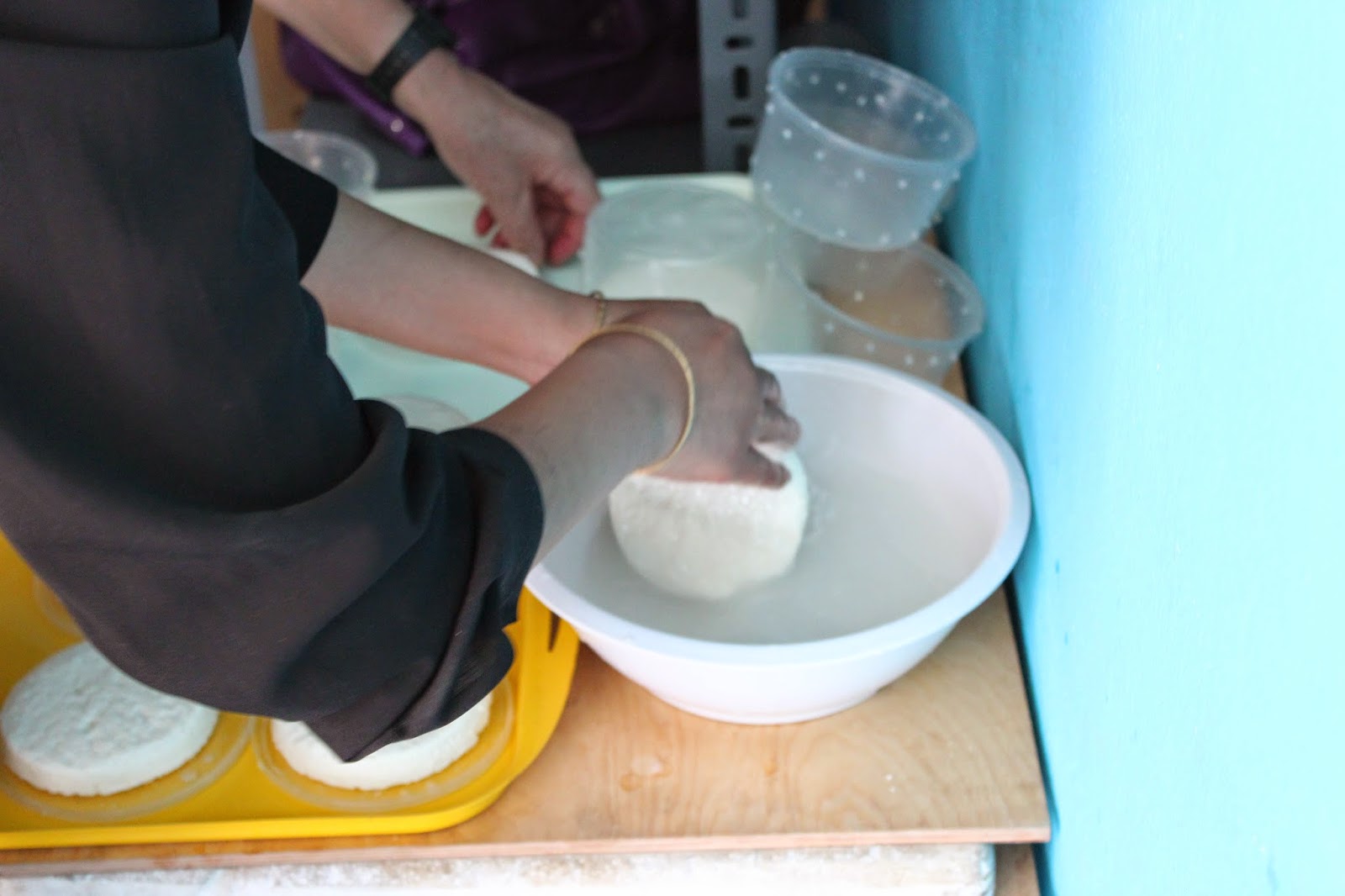A chance meeting as we shop for local yoghurt has given us opportunities
to make some traditional European style soft cheese. 'Theki Dairy' is run by Binuka Joshi, a mother of 2,
who only a few months ago saw a gap in the market for a Hand Made yoghurt. The rapid chilling and collecting of milk is a problem in Nepal and products often only carry a shelf-life of two days! So Farm Fresh yoghurt, made daily, using milk produced by
her families’ cows, found a ready market.
After a couple of hour’s
tuition in the craft of yoghurt making, Binuka opened her shop in Jawalakhel, Kathmandu. Kush, her husband , designed the logo based
on the traditional wooden Theki jar in
which yogurt used to be made . They have invested in simple equipment and a
display fridge, done some refurbishment and
are now selling all that they can make.
 |
| Binuka with her logo and the finished cheese |
This hard working, business minded family asked for some
help with guiding their way forward and developing new products. Binuka also produces Paneer , an Indian cheese that
requires no fermentation. After heating to 90c and allowing it to cool the milk
is clotted by adding a small amount of lemon juice. The resulting solids are strained through a
muslin bag and pressed in a mould. Paneer is the most common Indian cheese and
is one way of preserving surplus milk. However, as it is readily available in
Nepal it is tough to make a decent margin.
 |
| Creating a recipe |
Binuka was excited at the opportunity of being able to offer
her customers a fermented cheese. So in
her micro dairy we made our first tentative efforts at creating the
new cheese. Fortunately, I had bought from the UK, some rennet and freeze
dried starter. Using a packet of starter we made up a ‘mother ’, so that our
supply of lactobacilli would not run out.
As you might in your own kitchen, we used 5 litres of milk
with the aim of making 500gms of cheese.
 |
| Cut curds are stirred before letting them rest |
The process went along well until
after adding the rennet and waiting the required 50 minutes only a very weak
curd was created. There was nothing we could do but wait and after double the
normal time a curd developed and we cut it. We filled handmade moulds, left
them to drain overnight and then salted the now firm cheese the next day.
 |
| Binuka fills the moulds |
 |
| Curds drain |
 |
| 'Heath Robison Rules'-hand made moulds |
 |
| Salting the cheeses |
So we had made a cheese and Binuka was delighted. Jude had
time to experiment with fruit flavoured yogurt and discussed the idea of ice-cream.
But I was not happy! The curd was too hard and salty. The extra time taken to
form a firm coagulation had allowed the curd to dry out. We had also cut the
curd too small which had not helped the situation. We never intended to make a
long keeping cheese so after a week we tasted it and discovered we had created
something like a traditional Lancashire cheese.
We’ve had a couple of attempts since and managed to overcome the coagulation
problem. Now, the milk we use is only heated to to 72c for 30 seconds – the European
standard for pasteurisation. Pasteurising by boiling seems to be common place
in Nepal, but this brings with it a problem of protein denaturisation, and
difficulty setting a curd.
 |
| Jude and Binuka visit a local market to promote 'Theki Maid' |
A final trial has resulted in a satisfactory recipe.
Judith and Binuka were keen to promote the new product so they have made a
visit to ‘The Yellow House’, a farmer’s market, where the cheese was well
received. On the back of these accolades we have done a production run of
another 4 cheeses!! These will be on sale late next week.
 |
| Another happy customer, Daphne |
The entire process from conceiving the idea, making and
testing the product, and finally putting the cheese in the chiller for sale
will have taken 6 weeks. We've all learnt new skills and had fun!

Excellent job you Simon did. It is very traditional work chosen that denotes the exact Nepali tongue.
ReplyDeleteWhy Theki has stopped supplying now?
ReplyDelete